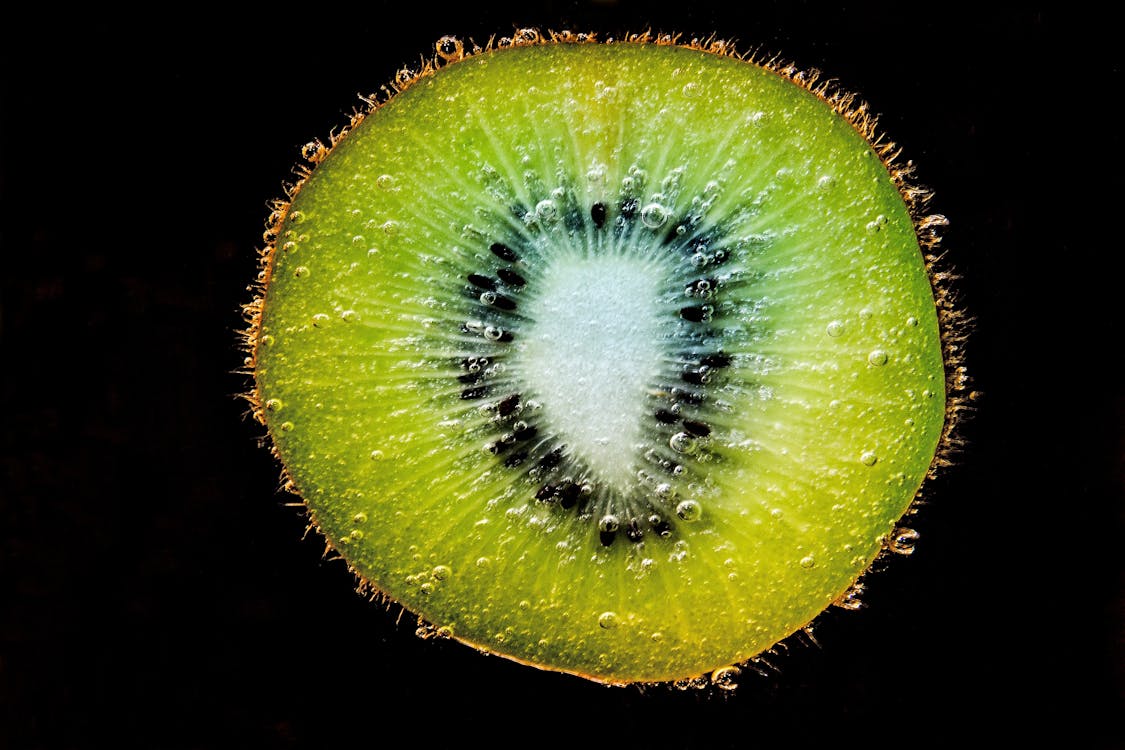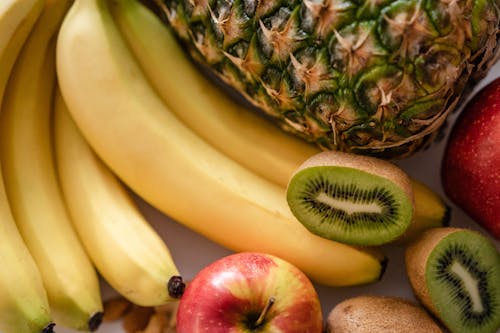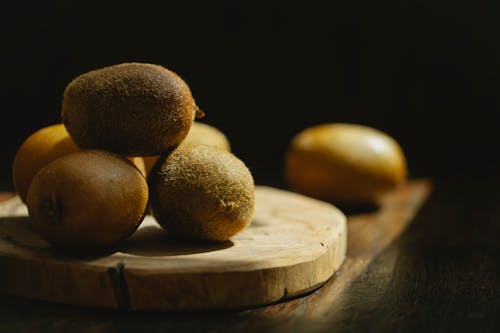Table of Contents
The Delectable Joy of Kiwifruit: A Small Wonder of Nature
Kiwifruit, commonly known as just “kiwi,” is a tiny but extraordinary fruit that has captured palates all over the world with its distinct flavour and incredible health advantages. This fuzzy green jewel is a favourite for nibbling as well as cooking because of its vivid emerald flesh and small black seeds. The kiwifruit has gone a long way to deserve its reputation as a popular dessert, having originated in China and now being widely cultivated in nations like New Zealand and Italy.
A Synopsis of Kiwifruit’s History
Because of their similar appearance, the kiwifruit and the native flightless bird of New Zealand are sometimes confused, however they are unrelated. Actinidia deliciosa, the scientific name for kiwifruit, is derived from China, where it was first referred to as the Chinese gooseberry. The fruit has been grown and consumed for its many health advantages and sweet, tangy flavour since ancient times.
When kiwifruit arrived in New Zealand early in the 20th century, it was once known as the “Chinese gooseberry.” But the fruit’s distinctive qualities were not adequately conveyed by this moniker. The fruit’s pivotal moment came with the launch of a successful rebranding campaign in the middle of the 20th century. The fruit was dubbed “kiwifruit” in order to increase its marketability and profit from its connection to New Zealand, the home of the native bird known as the Kiwi. This rebranding proved to be a wise decision, as kiwifruit’s appeal spread over the world.
The Delightful Feeling
The unique flavour of the kiwifruit is one of its most notable characteristics. A ripe kiwifruit is a delicious treat for the taste buds, presenting a balanced blend of sour and sweet. A kiwi’s flesh has a vibrant green colour with tiny, edible black seeds scattered throughout, which contrasts nicely in terms of texture and colour. The distinctiveness of this fruit adds to its popularity as a refreshing and sweet snack.
Nutritional Advantages
Kiwifruit is a nutritious powerhouse in addition to being a delicious delight. Kiwifruit is a fruit that is high in vitamins, minerals, and antioxidants, and it has many health benefits. The following are some of this amazing fruit’s main nutritional components:
1.Vitamin C: It is well known that kiwis have a significantly higher vitamin C content than oranges. Vitamin C is essential for healthy skin, wound healing, and immune system support. You can get more than 100% of your daily recommended dose of vitamin C from only one medium-sized kiwifruit.
2. Fibre: Rich in dietary fibre, kiwis can help with digestion, increase feelings of fullness, and possibly even help control blood sugar levels. Kiwifruit’s soluble and insoluble fibre blend promotes intestinal health, which is critical for general wellbeing.
3. Vitamin K: This nutrient is necessary for healthy bones and blood coagulation. Vitamin K from kiwifruit contributes to your daily requirement in a substantial way. It’s a nutrient that is frequently disregarded but is essential to preserving our health.
4. Potassium: Rich in potassium, which is essential for heart health and blood pressure regulation, kiwis are a good source of this mineral. By balancing the effects of salt on the body, potassium lowers the risk of hypertension and other cardiovascular problems.
5. Antioxidants: Antioxidants like lutein and zeaxanthin found in kiwis are good for the health of your eyes. These antioxidants lower the incidence of age-related eye disorders by shielding the eyes from damaging ultraviolet (UV) radiation and oxidative damage.
6. Folate: Also referred to as vitamin B9, folate is necessary for the synthesis and maintenance of DNA. Pregnant women should take extra care of it since it helps shield developing foetuses from neural tube abnormalities. Kiwifruit is a beneficial addition to the diet since it has a substantial amount of folate.
7. Vitamin E: As an antioxidant, vitamin E helps keep skin healthy and shields cells from oxidative harm. A considerable quantity of vitamin E can be found in kiwifruit, which can help with your daily consumption.
8. Copper: Required for the production of red blood cells, the upkeep of strong bones and nerves, and the growth of connective tissues, copper is a vital mineral for the body. Kiwifruits are a good source of copper.
Kiwifruit are a great complement to a balanced diet because of their many nutritional advantages. Kiwifruit provides a delectable and all-natural remedy for immune system stimulation, digestive health support, and skin health maintenance.
Gastronomic Adaptability
Kiwifruit is a delicious addition to a variety of recipes, not only as a snack. Simple fruit salads to more intricate recipes like kiwi salsa, smoothies, desserts, and even savoury dishes like kiwi-marinated chicken may all benefit from this fruit’s sweet and tangy flavour. An average meal can become a visual and culinary marvel because to the fruit’s vivid colour and distinctive texture.
Kiwi Smoothie: Making a tasty smoothie with kiwifruit is one of the most common ways to consume them. Kiwi can be blended with other fruits, such as strawberries and bananas, and sweetened with a little honey, yoghurt, or almond milk. The outcome is a delicious, vitamin-rich, creamy treat that’s ideal for breakfast or as a nutritious snack.
Kiwi Salsa: A zesty salsa can be made with kiwifruit. Chop some cilantro and squeeze some lime juice, then chop up some kiwis, red onion, and jalapeño. Serve this kiwi salsa with tortilla chips or as a topping for fish or grilled chicken.
Make some kiwi sorbet for a guilt-free dessert option. Blend kiwifruit with lime juice and a small amount of sugar, then freeze. The outcome is a tasty frozen dessert that is free of dairy and ideal for a hot summer’s day.
Kiwi Salad: A simple green salad can be improved with kiwifruit. Cut kiwis into slices and combine them with feta cheese, mixed greens, and balsamic vinaigrette. The salad is given a welcome contrast by the tart and sweet kiwi.
Kiwi Marinade: Kiwifruit is a natural meat tenderizer as well. Kiwi is a great addition to a marinade for meats like chicken or pig since its enzymes can aid in the breakdown of proteins. Just be out that if you marinade the meat for too long, the kiwi will cause it to become excessively soft.
These culinary uses highlight how adaptable kiwifruit is and how it works well in a variety of recipes. Its distinct flavour works well in both savoury and sweet recipes, and any dish benefits from the eye-catching green hue it contributes.
How to Choose and Preserve Kiwifruit
When selecting kiwis, seek out those that are juicy, devoid of wrinkling, and give to light pressure when your thumb is applied. When a fruit is ripe, its skin should be smooth and it should give slightly.
Kiwifruit that are still unripe can be allowed to mature at room temperature. After being selected, kiwifruit continue to ripen, so if they’re not quite ready, be patient. When they give slightly when gently pressed and have a slight give, you will know they are ripe.
Kiwifruit can be kept in the refrigerator to prolong its shelf life after it is ripe. Stored in the refrigerator, they will keep for several weeks. To enjoy them at their full flavour and nutritional value, though, it’s better to eat them within a week or two.
Kinds of Kiwifruits
Although the most popular variety is the green kiwifruit, sometimes called the Hayward kiwifruit, there are additional kiwifruit cultivars that have distinct qualities of their own. These consist of:
1. Gold Kiwifruit: The flesh of the gold kiwifruit is bright and golden, with a smooth, bronze skin. Those who want a softer flavour often choose it because it is sweeter and less sour than green kiwis.
2. Red Kiwifruit: This relatively recent addition to the kiwifruit family is the red kiwifruit. Its flesh is reddish-purple in colour and has a somewhat distinct flavour and scent. The flavour is frequently described as a kiwi, strawberry, and watermelon blend. Although rarer, this kind is becoming more and more well-liked.
3. Baby Kiwifruit (Kiwi Berries): Compared to their larger siblings, baby kiwifruit, also called kiwi berries, are substantially smaller. They are usually consumed whole, skin and all, although they taste and feel similar. They are a handy, bite-sized snack that are frequently compared to grapes in size.
You can select the kiwifruit kind that most closely matches your taste preferences because each one gives a little distinct experience.
The Health Advantages of Kiwifruit
Because of its outstanding nutritional profile, kiwifruit is a great addition to a balanced diet and has many health benefits. The following are some ways that kiwifruit can improve your health:
1. Immune System Support: Kiwifruit is a great option for boosting your immune system because of its incredibly high vitamin C concentration. Strong antioxidants like vitamin C can shield your cells from oxidative harm. Additionally, it is necessary for the synthesis of white blood cells, the body’s first defence against pathogens.
2. Digestive Health: Both soluble and insoluble dietary fibre can be found in abundance in kiwis. By reducing constipation, facilitating regular bowel movements, and fostering a diverse gut microbiota, this fibre content can support good digestion. Actinidin, one of the kiwifruit’s enzymes, can aid in the breakdown of proteins and facilitate the digestion of other foods.
3. Heart Health: Kiwifruit’s high potassium content helps lower the risk of heart disease and stroke while also regulating blood pressure. Furthermore, kiwifruit’s dietary fibre has the ability to reduce cholesterol, an important aspect of cardiovascular health maintenance.
4. Eye Health: Kiwifruit is high in lutein and zeaxanthin, two important antioxidants that are known to shield the eyes from oxidative damage and lower the incidence of cataracts and age-related macular degeneration.
5. Skin Health: Kiwifruit’s vitamin C and vitamin E combination supports the maintenance of healthy skin. Collagen synthesis, which is necessary for maintaining the suppleness of skin and delaying the ageing process, depends on vitamin C. Antioxidant vitamin E shields the skin from UV rays and other environmental stresses.
6. Bone Health: The vitamin K in kiwis lowers the risk of osteoporosis and helps maintain a healthy bone density. It facilitates the right use of calcium, an essential element for strong bones.
7. Folate for Pregnancy: As folate helps prevent neural tube problems in developing foetuses, it is essential for pregnant women and may be found in abundance in kiwifruit. It aids in the initial phases of foetal development.
8. Copper for Blood Health: Red blood cell formation depends on copper, a mineral found in kiwifruit. It also helps to keep connective tissues, bones, and nerves in good condition.
All of these health advantages make kiwifruit an excellent complement to any diet. Kiwifruit can be used for a variety of purposes, including addressing specific health issues, enhancing general health, and providing a satisfying and healthy snack.
Kiwifruit and Managing Your Weight
Kiwifruit can support you in your attempts to control your weight. As follows:
1. Low Calorie: Kiwifruit has a calorie count that is comparatively low, making it a filling and healthy snack that doesn’t add too many extra calories to your daily consumption. Usually, a medium-sized kiwifruit has between 60 and 70 calories.
2. High in Fibre: Kiwifruit’s dietary fibre helps encourage a full sensation, which lowers the chance of overindulging in between meals. A high-fiber diet has been associated with obesity prevention and weight control.
3. Natural Sweetness: The inherent sweetness of kiwis can quench your sweet craving without the need for high-calorie treats or added sugars. Because of this, it’s a great substitute for sugary snacks and desserts.
4. Digestive Help: The enzymes found in kiwifruit, such as actinidin, help facilitate protein digestion and improve digestive health in general. To control weight, the digestive system must be in good working order.
Kiwifruit can be a delicious and practical addition to your diet that can help you achieve your weight loss objectives. It offers a low-calorie, high-nutrient, and gratifying sweet treat.
Kiwifruit for Skin Health
Kiwifruit’s vitamins and antioxidants can help maintain clear, healthy skin. Kiwifruit can do the following for your skin:
1. Vitamin C for Collagen Production: Collagen is a protein that provides your skin its suppleness and youthful appearance. Vitamin C is necessary for this process. Vitamin C aids in the synthesis of collagen, which is what keeps your skin smooth and firm.
2. Vitamin E for UV Protection: As a potent antioxidant, vitamin E helps shield your skin from UV rays and other environmental pollutants. It lessens the chance of sun-induced skin damage and helps prevent early ageing.
3. Hydration and Skin Texture: The high water content of kiwis can help preserve the hydration and texture of your skin. Maintaining adequate skin moisture can minimise the visibility of fine lines and wrinkles and is crucial for maintaining a healthy complexion.
4. Reduction of Skin Redness: The vitamin C content and anti-inflammatory qualities of kiwifruit can aid in promoting even skin tone and reducing skin redness. It is especially advantageous for people who have
To sum up, the kiwifruit is proof of the abundance of nature. It is a lovely addition to our lives because of its rich history, remarkable health advantages, and culinary diversity. From its humble beginnings in China, the kiwifruit has gained popularity all over the world thanks to its unique blend of sweet and tart flavours. It’s a tiny wonder that nature has offered, delivering a distinct and exquisite taste for everyone to appreciate, whether it’s eaten on its own or in other meals.



